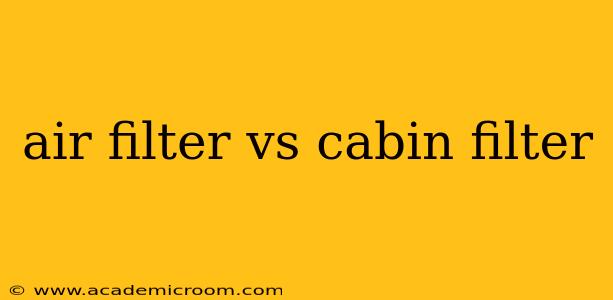Choosing the right filter for your vehicle is crucial for both performance and health. Many car owners confuse air filters and cabin air filters, leading to potential problems. This comprehensive guide clarifies the distinctions between these two essential components, explaining their functions, locations, and the importance of regular replacement.
What is an Air Filter?
The engine air filter sits within your car's engine compartment and protects the engine's vital components from harmful contaminants present in the outside air. These contaminants include dust, dirt, pollen, insects, and other airborne debris. By filtering out these particles, the air filter ensures clean air reaches the engine, preventing premature wear and tear and maintaining optimal performance. A clogged air filter restricts airflow, leading to reduced engine power, increased fuel consumption, and potentially even engine damage.
How Often Should I Replace My Engine Air Filter?
The recommended replacement interval for your engine air filter varies depending on driving conditions and the manufacturer's specifications. However, a good rule of thumb is to replace it every 12,000 to 15,000 miles or annually, whichever comes first. If you frequently drive in dusty or dirty environments, more frequent replacements might be necessary. Visually inspecting the filter is also recommended; if it appears significantly dirty or clogged, it's time for a change.
What is a Cabin Air Filter?
The cabin air filter, also known as the pollen filter or interior air filter, is located inside the vehicle's passenger compartment, typically within the HVAC (Heating, Ventilation, and Air Conditioning) system. Its primary function is to filter the air entering the cabin, ensuring clean and fresh air for the occupants. This filter removes dust, pollen, allergens, mold spores, and other pollutants from the air you breathe inside your car. A dirty cabin air filter can lead to reduced airflow, unpleasant odors, and potentially exacerbate allergies or respiratory problems.
How Often Should I Replace My Cabin Air Filter?
Similar to the engine air filter, the replacement schedule for the cabin air filter depends on driving conditions and manufacturer recommendations. Generally, it's advised to replace it every 12,000 to 20,000 miles or annually, whichever comes first. However, if you suffer from allergies or frequently drive in areas with high levels of air pollution, replacing it more often may be beneficial. Again, visual inspection can help determine the need for replacement.
What Happens if I Don't Replace My Air Filters?
Neglecting to replace both the engine air filter and the cabin air filter can have serious consequences:
- Engine Air Filter: Reduced engine performance, increased fuel consumption, engine damage, and potential premature engine failure.
- Cabin Air Filter: Reduced airflow, unpleasant odors, the buildup of allergens and pollutants in the cabin, increased risk of respiratory problems and allergies for occupants.
Where are the Air Filters Located?
The location of both filters varies depending on the vehicle's make and model. The engine air filter is typically located within the engine compartment, often in a black plastic housing. The cabin air filter is usually found behind the glove compartment, under the dashboard, or within the HVAC system housing. Consult your vehicle's owner's manual for the precise location of each filter in your specific car.
Can I Replace Air Filters Myself?
Replacing both the engine air filter and the cabin air filter is generally a straightforward process, and many car owners can perform these tasks themselves with minimal tools. However, always consult your vehicle's owner's manual for specific instructions and recommendations. If you are uncomfortable performing the replacement, it is best to consult a qualified mechanic.
This article provides general guidance; always refer to your vehicle's owner's manual for specific instructions and recommendations regarding air filter replacement. Regular maintenance of these filters is key to ensuring your vehicle's longevity and the well-being of its occupants.
